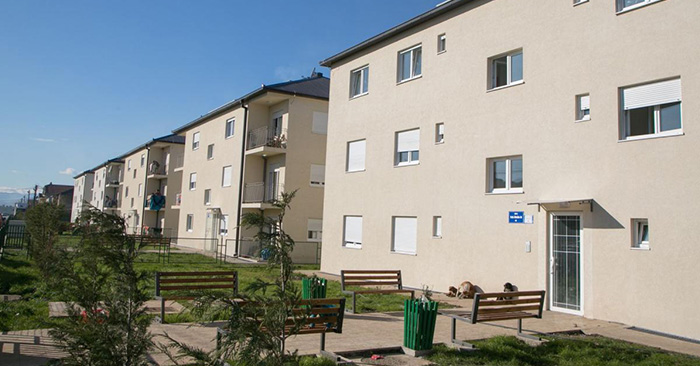
Close to 36 000 Vulnerable Individuals Provided with Decent Homes
At the end of 2023, close to 36 000 vulnerable persons had been provided with access to decent housing in the four Partner Countries. The RHP provided different housing modalities based on the needs of its beneficiaries:
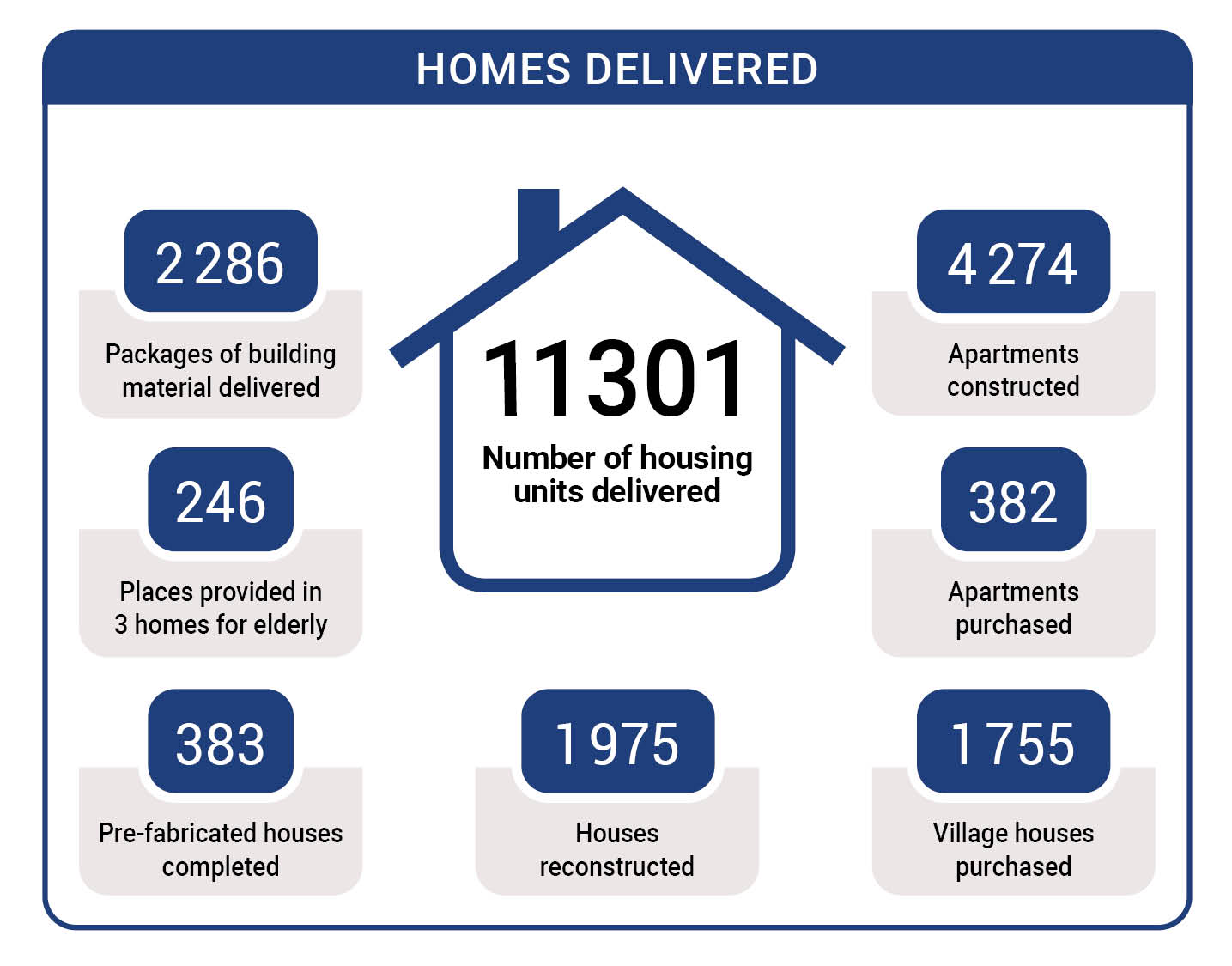
Enhanced Regional Cooperation
Although the Regional Housing Programme consisted of four individual Country Housing Projects, one of the cornerstones of the RHP’s success was its regional character. The four Partner Countries worked very closely together to reach their common goal. They supported each other and exchanged information daily to maintain a steady pace of RHP implementation, to find synergies in their work and to learn from each other’s successful experiences within the RHP. All stakeholders unanimously agree that the RHP has had a significant impact on improving the regional cooperation, security and reconciliation of people that were on different sides of the armed conflict over 20 years ago.
Renewed Commitment by Partner Countries
In November 2023, in a final joint statement delivered at the RHP Final Conference in Sarajevo, Bosnia and Herzegovina, the RHP Partner Countries celebrated the achievements of the Regional Housing Programme – not only the provision of housing to the most vulnerable but also, in so doing, the facilitation of access to economic opportunities and social rights.
It was moreover noted that the RHP had contributed to the restoration of mutual trust between the countries, as well as the promotion of peace and co-existence, and was a unique post-conflict reconstruction programme which could serve as a model for resolving other displacement situations. The countries also reaffirmed their commitments to protect and promote the rights of refugees, returnees and internally displaced persons, and to provide all necessary support to end their displacement and enable them to live as equal citizens in the Partner Countries, free from discrimination.
Read the statement in English here and in local language here.
Strengthened Operating Standards
The Partner Countries were in charge of implementing the Programme. This was one of the factors that set RHP apart from most other housing projects in the region: this strong ownership built up the Partner Countries’ institutional capacity to implement projects in the future, in line with EU and international standards. To support them in implementation, the Partner Countries benefitted from extensive training, management tools and improved operating standards. Support to national structures was also offered through in-country resident Technical Assistance which was embedded within the implementing institutions.
Since 2013 and until the end of the RHP, this Technical Assistance was provided by a consortium comprising EPTISA, GIZ and the Danish Refugee Council. Support to Partner Countries with financial management and accounting matters was provided by Deloitte d.o.o. Beograd. The CEB was entrusted with overseeing and coordinating all RHP implementation support activities, including managing the provision of Technical Assistance.
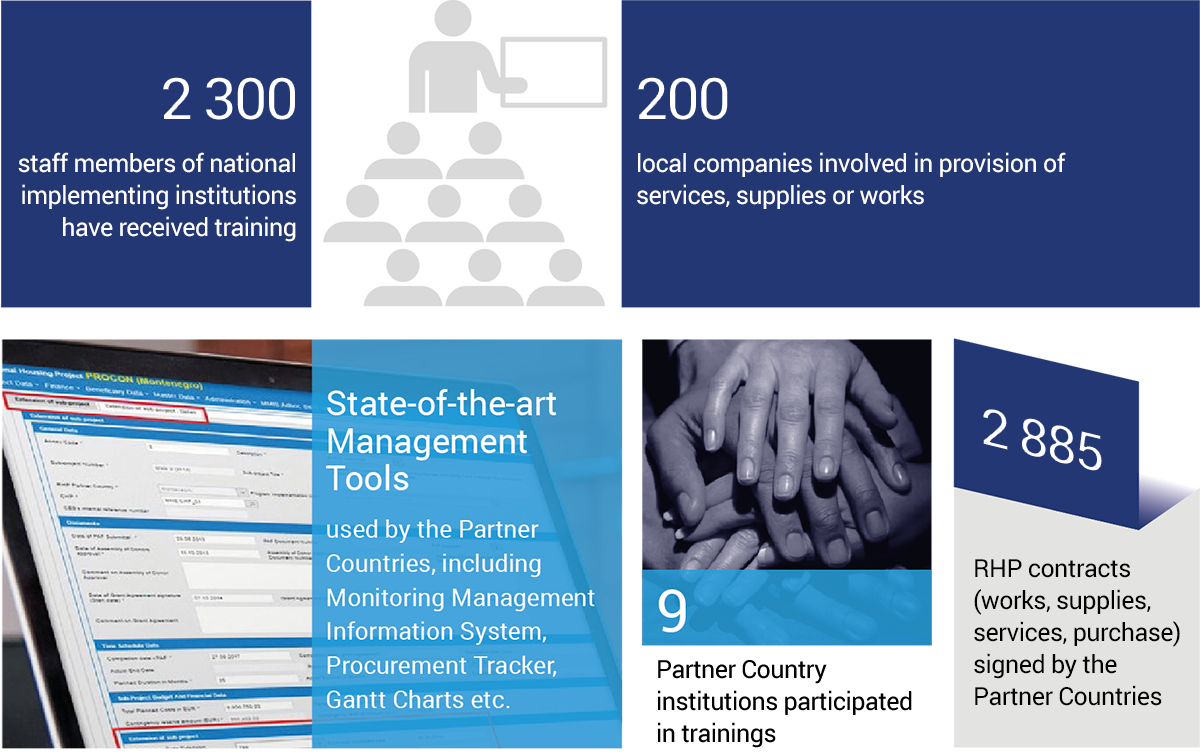
Capacity building
The RHP Lead Institutions, Project Implementation Units and local governments benefitted from tailor-made training sessions which strengthened their capacities to implement projects.
The on-the-job training provided to the implementing structures was complemented by specific RHP management tools. These tools consisted, for instance, of Gantt Charts, a Procurement Tracking System, Risk Registers and the MMIS (Monitoring Management Information System). They allowed close follow-up of all the operational and financial aspects of implementation and early identification of risks. Finally, RHP sub-projects were implemented following strict Master Technical Documentation and other standards/templates. These standards ensured compliance with certain minimum requirements on issues such as urban-technical conditions, building permits, building standards and environmental issues.
This combination of training, management tools and standards again offered two benefits. First, it helped ensure that projects were implemented according to best practices. Indeed, the Partner Countries’ capacities in project planning, implementation and monitoring improved considerably. Second, it helped guarantee that the housing stock provided within the context of the RHP offered a quality living environment to beneficiaries and was durable.
The above-mentioned on-the-job training, the development of RHP management tools and the compliance with standards was made possible thanks to the Technical Assistance financed essentially by the European Union, complemented by some other main Donors, and embedded in the Partner Country implementing structures.
Sustained Cooperation with Local Governments
The RHP helped strengthen the cooperation between the central government and local self-governments, as the Programme was implemented in hundreds of municipalities in the region. Local administrations had a high level of ownership of the projects and were actively involved in their implementation, including in procurement and beneficiary selection. This cooperation strengthened the capacities of local administrations.
Role of municipalities

In Serbia, municipalities play a pivotal role in the implementation of the RHP as some of the sub-projects will be implemented in a decentralised manner – by the municipalities themselves – as regards the delivery of building material packages and the purchase of village houses. A large number of Serbian municipalities will also own and maintain RHP-financed apartment buildings for which they need to donate land and secure infrastructure connections. The municipalities also play a key role in the construction of pre-fabricated houses.
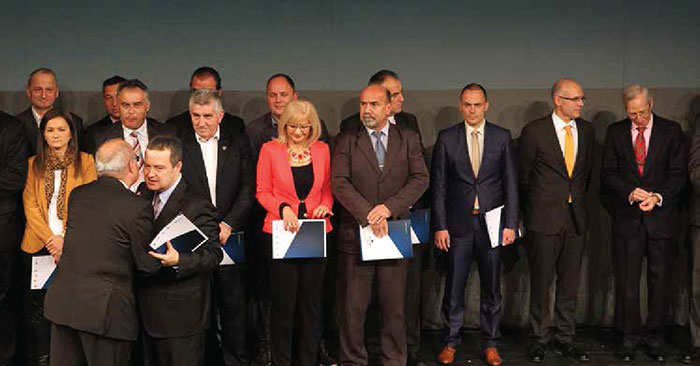
In Bosnia and Herzegovina, the involvement of municipalities will continue in the years to come as a large number of RHP beneficiaries will have their houses reconstructed. The support of municipalities for the RHP is very important as they issue building permits, manage technical acceptances, provide land and infrastructure as well as support in sustainability issues. Furthermore, 19 municipalities will own RHP-financed apartment buildings in which RHP beneficiaries are accommodated.
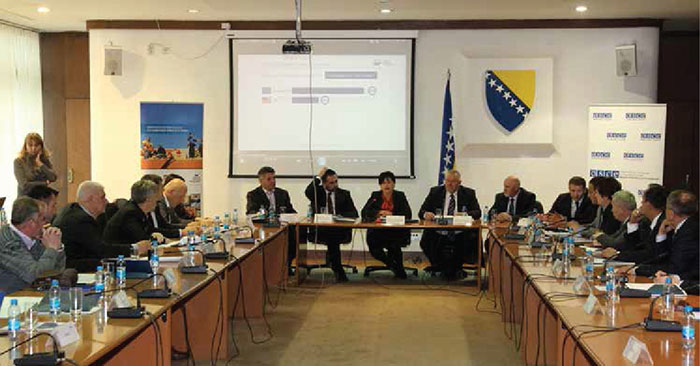
In Croatia, all municipalities involved in RHP projects donate the respective land and commit to be in charge of the maintenance of the newly constructed facilities.
In Montenegro, municipalities also play an important role: as in the other Partner Countries, municipalities have donated land and financed the costs of preparing the building sites and of providing infrastructure facilities. More importantly, municipalities also own and maintain the RHP-financed buildings.
